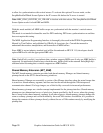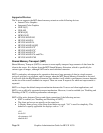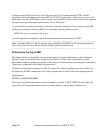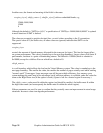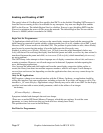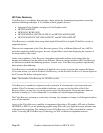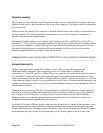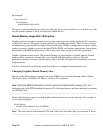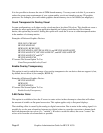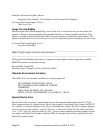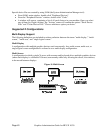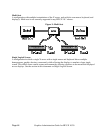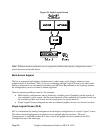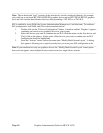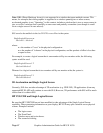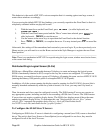It is also possible to decrease the size of GRM shared memory. You may want to do this if you want to
reduce the swap-space requirements of your system and/or you do not intend to run any 3D graphics
processes. For example, you could reduce graphics shared memory size to 0x100000 (one megabyte).
Count Transparent In Overlay Visual
In some configurations, an 8-plane overlay visual may have less than 256 colors. This should not cause a
problem for most applications. If an application depends on 8-plane visuals having 256 colormap
entries, this option may be useful. Setting this option will cause the X server to count transparent entries
in the number of colormap entries.
Examples of Relevant Graphics Devices:
CRX-24[Z], CRX-48Z
HP VISUALIZE-EG
HCRX-8[Z], HCRX-24[Z]
HP VISUALIZE-8, HP VISUALIZE-24, and HP VISUALIZE-48[XP]
HP VISUALIZE-FX
2
, HP VISUALIZE-FX
4
, and HP VISUALIZE-FX
6
HP VISUALIZE-FX
5
and FX
10
HP VISUALIZE-FXE
X*screens File Screen Option To Use:
CountTransparentInOverlayVisual
Enable Overlay Transparency
This option is used to enable the usage of an overlay transparent color on devices that can support it, but,
by default, do not allow it (for example, HCRX-8).
Examples of Relevant Graphics Device:
HP VISUALIZE-EG
HCRX-8[Z]
HP VISUALIZE-8
X*screens File Screen Option To Use:
EnableOverlayTransparency
3-Bit Center Color
This option is available to force the X server to center colors in the colormap to values that will reduce
the amount of twinkle on flat-panel conversion. This option applies only to flat-panel displays.
The twinkling effect is caused by the analog-to-digital conversion. Due to noise in the analog signal, it is
possible for a color near a boundary between two digital values to cause the conversion to bounce back-
and-forth between the two colors (i.e., "twinkle"). In order to avoid this effect, the server "centers" the
colors as far from the color boundaries as possible.
Graphics Administration Guide for HP-UX 10.20
Page 41



